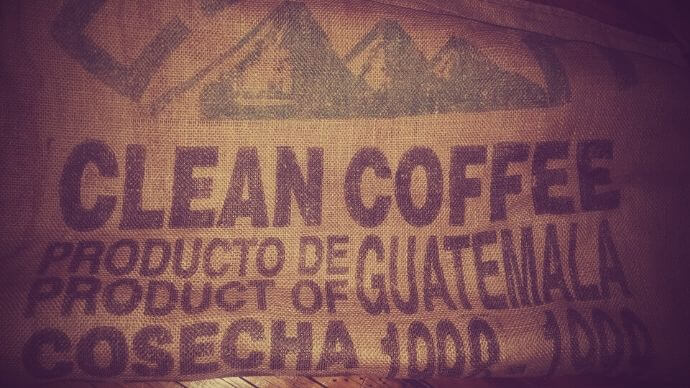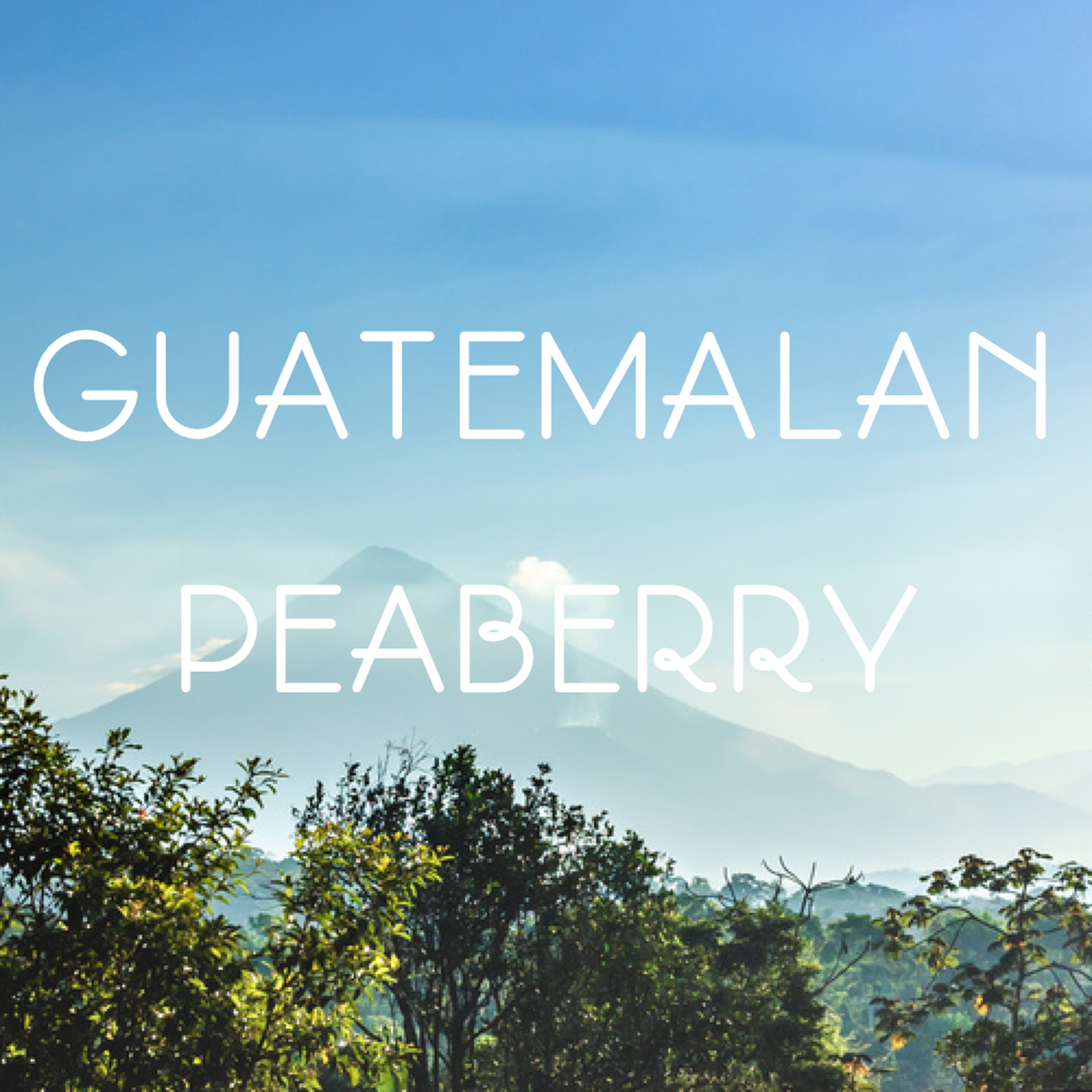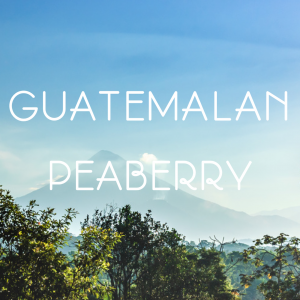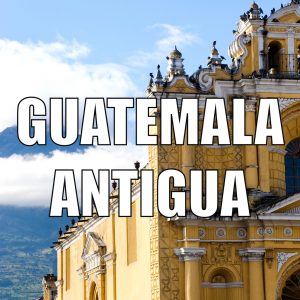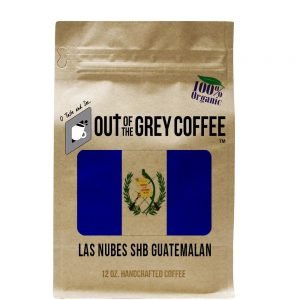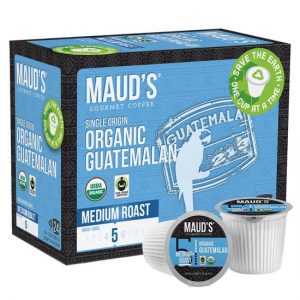Guatemala may be small compared to other coffee-growing countries but it’s one of the top 10 coffee producers of coffee in the world.
But, how good can Guatemalan coffee actually be? Join me as we look into the Guatemalan coffee production, the facts, and the growing regions. Let’s discover all about the Guatemalan coffee flavor and why should you give it a try.
Are you ready for a journey to a unique central American country that boasts diversity on every step of the way?
Let’s discover the best coffee brands from Guatemala!
[su_note note_color=”#fcf7e6″]When you buy a product via the links on IlCappuccinoExpress.com, I may earn a small affiliate commission at no extra cost to you.[/su_note]
TOP PICK 5/5 | Volcanica Guatemala Peaberry Antigua Guatemalan Peaberry is a unique type of coffee that represents the top 5% of the beans from only the best crops. It’s the highest quality coffee you can get your hands on and while it’s excellent for the manual coffee brewing, you can easily use it to brew coffee in a number of coffee makers (even drip and espresso machines). |
Contents
Why is Guatemalan coffee so special?
Guatemalan coffee has been considered a jewel among the central American coffee production. In other words, coffee coming from Guatemala is unique for a number of reasons.
They traditionally grow Arabica coffee and it can be suitable for a number of tastes and palates.
The country boasts with diverse climate and geography, and fertile soil. These factors enable it to grow coffee in many different regions, producing unique coffee beans in flavor profile and taste.
What’s interesting is that coffee can be produced (almost) all around the country. They also harvest the coffee in different months of the year, depending on the region. After all, there are more than 300 microclimates in Guatemala, which make it one of the most diverse places in the coffee production world!
Since there is a lot of rain and humidity in Guatemala, they mostly go with wet-processed coffee, which gives more consistent results.
Here are eight different Guatemalan coffee growing regions:
- Acatenango Valley: coffee is high in acidity with a fragrant aroma, balanced body, and fresh finish
- Antigua: rich aroma, balanced yet sweet taste, and full body
- Lake Atitlan: aromatic coffee with full body and noticeable acidity
- Coban Rainforest: medium body, light acidity, fruity flavor, and fragrant aroma with light wine notes
- Fraijanes Plateau: soft aroma with full body and marked acidity
- Huehuetenango Highland: fine and intense acidity, full-body, with wine notes
- New Oriente: aromatic but well-balanced with marked acidity and full body with hints of chocolate
- Volcanic San Marcos: floral notes in the aroma and flavor, pronounced acidity with a solid body
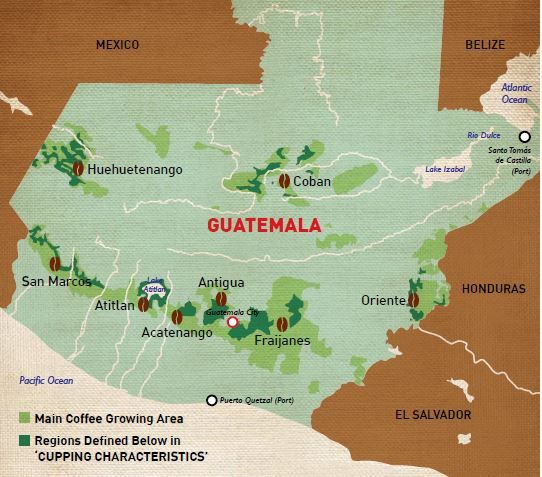
Guatemalan coffee types
Coffee growing in Guatemala has come a long way. Coffee types grown in Guatemala are varieties of Arabica beans:
- Typica
- Catuai
- Caturra
- Bourbon
Guatemalan coffee taste
Different climate, soil, and growing regions have an immense influence on the Guatemalan coffee profile. Here’s what you can expect from their coffee:
- Different levels of acidity (but bright and pleasant)
- Medium to full body
- Floral and citrus aroma
- Chocolate, sweet, and nutty notes with an occasional smokiness
Best Guatemalan coffee brands
Guatemala Peaberry Antigua Coffee
- Medium roast
- Heavy bodied and smooth
- Slightly spicy
- Smoky and chocolate hints
A blend of smooth and robust, Guatemala Peaberry sets high standards for Guatemalan coffee. It’s unique not only in the fact that it’s grown on volcanic soil but also because of the type of coffee beans called peaberries. Normally, a coffee cherry contains two seeds, but peaberry contains only one. This happens because of a natural mutation in only about 5% of cases, making it unique.
What’s more, there’s the whole roasting process (which is different from the “normal two-seeded coffee”), the selection (they’re hand-picked), and the taste.
Peaberry Antigua is smoother in flavor and richer in body, compared to other coffees on the list. If you’re looking for a smooth and tasty coffee experience, this is it. It’s not as full in flavor as Costa Rican peaberry, but its flavor is clean and fresh. While you can use it in different coffee makers, the best way to experience it with all it has to offer is with the cold brew method.
Most important highlights
- Compatible with different coffee makers
- Grown on volcanic soil
- Smooth and drinkable
- Not bitter or acidic
- Roasted on demand
Guatemala Antigua coffee (Decaf Available)
- Medium roast
- Smooth body and vibrant acidity
- Nutty, chocolate flavor
- Wet-processed and sun-dried
For a delicious, smooth, and flavorful cup of joe, Guatemala Antigua easily ticks all the boxes as the coffee is roasted on demand, ensuring the highest quality and maximum freshness.
This coffee comes from Volcanica company and they ensure professional service and quick delivery. This type of beans works well for a number of coffee brewers, including espresso machines, drip coffeemakers, French press, and pour-over. Guatemala Antigua beans are grown on volcanic soil and harvested twice a year.
Not into caffeine? Don’t worry, Antigua coffee comes as a Decaf option as well; the same quality, slightly more subtle, and without caffeine content.
Most important highlights
- Compatible with different coffee makers
- Grown on volcanic soil
- Harvested twice a year
- Decaf option available
- Rainforest Alliance Certified
- Roasted on demand
Guatemala Antigua Las Nubes Organic Coffee SHB
- Dark medium roast
- Soft acidity
- Hints of vanilla, spices, caramel
- Silky and buttery
Rich in flavors and aroma, this organic coffee is a surprise in a bag. You can choose whole beans of ground option that suits your favorite brewing method; there’s a decaf option available for all who want the flavor without the caffeine.
Out of the grey coffee is a company that strives to provide their customer with the most unique coffee experience every cup of the way. They’re small-batch organic coffee roaster from Pennsylvania, who roasts their coffee slowly to ensure the highest quality of each batch they ship.
The coffee is smooth and clean, without any bitterness (as long as you brew it correctly). It comes from a farm close to the city of Antigua. This coffee is Strictly Hard Bean (SHB), meaning that coffee is grown at higher altitudes, at 4,500 ft./1350 meters and above. The beans are harder, more sought after, and provide better consistency with each harvest.
Most important highlights
- Regular and decaf available
- Whole beans or ground coffee available
- Compatible with different coffee makers
- Organic coffee
- Handcrafted
- Decaf Swiss water processed
- Grown at higher altitudes
Maud’s Organic Guatemalan Coffee Pods
- Light-medium roast
- Medium body
- Medium acidity
- Smoky and chocolaty undertones
In terms of flavor profile, these Coffee pods are well-balanced and smooth with hints of spice that make this gourmet coffee unique. Regarding the taste, it’s not really strong but it comes with just the right acidity.
These coffee pods come from the Intelligent Blends company, that strives to provide premium, fresh, and gourmet coffee pods, without the middle man. The coffee pods are recyclable, which makes it convenient to use without any guilt.
These coffee pods are compatible with many different coffee makers, including Hamiton Beach, Mr.Coffee, K10 MINI Plus, K40/45 Elite, and many more.
Most important highlights
- Recyclable coffee pods
- Single-origin Arabica beans
- Compatible with a number of coffee machines
- USDA organic
- Fair-trade certified
- Made in the USA
How to make Guatemalan coffee: Best Brew Methods
Three of the best ways to make coffee from Guatemala are
- Pour Over: best for those who prefer subtle and flavor notes
- Cold Brew coffee: for those who want to experience full-body, medium acidity, and natural sweetness of the coffee
- French press: best for those who prefer darker roast or highlight the body and sweetness of beans
These three methods help to emphasize its flavor and body the most, but you can use it in any coffee maker of your choice.
Guatemalan coffee production facts and history
Coffee was first introduced to Guatemala back in the 18th century as a decorative plant. It took them about a century to turn these plants into a commercial product, and it happened when they were looking for an alternative to indigo and cochineal dye industries to save the economy. It’s been an important part of their economy ever since. Today, Guatemala is one of the top 10 coffee producers in the world. It used to be one of the top producers of Central America until 2011 when Honduras stripped it of that title.
At first, they began growing coffee in the areas of Amatitlan and Antigua in the south. These were small plantations and the work was though since they lacked both knowledge and technology. As time passed and they gained experience, the coffee industry began to increase. They didn’t grow coffee only on the south coast; they began to grow it around Guatemala City, Verapaz, and Chimaltenango.
In 1960, they founded Anacafé (Asociación Nacional del Café), a national association that represents all coffee producers in the country. This organization also strives to improve the life of farmers in rural areas. Anacafé has done a lot of work regarding the recognition and organization of Guatemalan coffee according to Wikipedia.
They have established Guatemalan Coffees brand and defined eight coffee regions under the slogan “A Rainbow of Choices”: Acatenango Valley, Antigua Coffee, Traditional Atitlan, Rainforest Coban, Fraijanes Plateau, Highland Huehue, New Oriente, and Volcanic San Marcos.
Nowadays, there are more than 125,000 coffee producers in Guatemala, and coffee makes up about 40% of their agricultural export revenue (Source). They export half of their production just to the United States. Their coffee is considered to be of high quality and it’s sought and praised by users all over the world.
Guatemalan coffee brands: a recap
Guatemala is rich in geographical and climate features that allow it to make unique coffee in terms of flavor, profile, and aroma. Yes, there are certain common features to all types of Guatemalan coffee, but each type of coffee bean brings something new to the table and into your cup.
There are many different options when it comes to the best Guatemalan coffee brands and you can get them online, but I’d recommend you double check when buying them online as you may get low quality and stale beans. For best results and high-quality coffee that’s freshly roasted before shipping, it’s best you turn to online shops (or local coffee shops) that specialize in coffee and are very strict about the quality of each bag.
Deciding on the best Guatemalan coffee brand isn’t easy; you can’t go wrong with any mentioned above. Still, if I had to choose one, I’d go with Guatemala Peaberry coffee. It’s medium roasted, heavy-bodied and it comes with hints of chocolate and smoky undertones which takes my daily cup to a whole new level. It’s smooth but it’s got the character as well since it’s grown on volcanic soil and carefully handpicked to ensure the best quality. What’s more, it’s compatible with different coffee makers; you can use it in a French press, espresso machine, and even drip machine!
On the other hand, if you’re looking for something that would fit into your k-cup coffee brewer, Maud’s coffee pods are an excellent option for a number of reasons: the pods are recyclable, which is definitely a huge plus. The coffee is certified organic and Fair-trade. What’s more, the light-medium roast and smoky undertones provide a new experience in terms of the taste profile. The coffee is smooth with hints of spice and it packs just the right acidity.
[su_divider]
Recommended Reading
[su_list icon=”icon: coffee” indent=”19″]
- Best Mushroom Coffee – 10 Brands To Try In 2022
- Best Low Acid Coffee Beans (Say Goodbye To Tummy Pain)
- Never Drink Cold Coffee gain: 12 Nifty Hacks And Tricks To Try Today
- 15 Delicious Winter Coffee Drinks You Must Try This Season
- Best Flavored Coffee Beans: A Tasty Sugar-Free Treat
- Best Espresso Machines Under $600 For Home
[/su_list]

